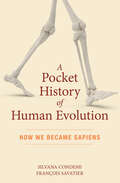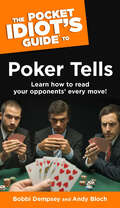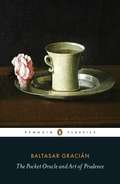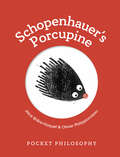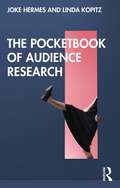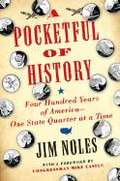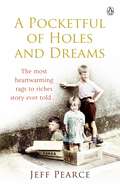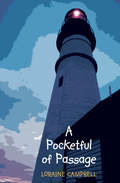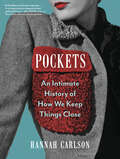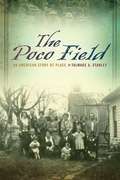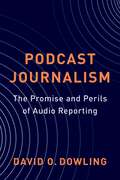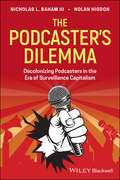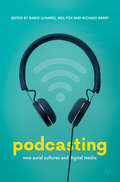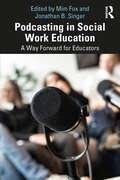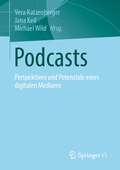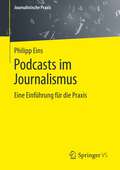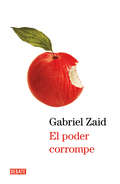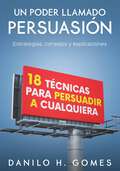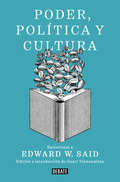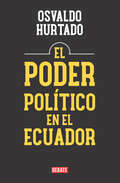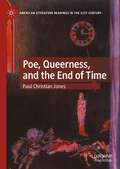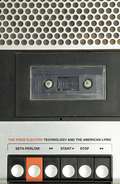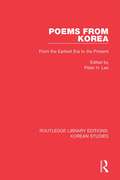- Table View
- List View
A Pocket History of Human Evolution: How We Became Sapiens
by Silvana Condemi François SavatierWhy aren’t we more like other apes? How did we win the evolutionary race? Find out how “wise” Homo sapiens really are. Prehistory has never been more exciting: New discoveries are overturning long-held theories left and right. Stone tools in Australia date back 65,000 years—a time when, we once thought, the first Sapiens had barely left Africa. DNA sequencing has unearthed a new hominid group—the Denisovans—and confirmed that crossbreeding with them (and Neanderthals) made Homo sapiens who we are today. A Pocket History of Human Evolution brings us up-to-date on the exploits of all our ancient relatives. Paleoanthropologist Silvana Condemi and science journalist François Savatier consider what accelerated our evolution: Was it tools, our “large” brains, language, empathy, or something else entirely? And why are we the sole survivors among many early bipedal humans? Their conclusions reveal the various ways ancient humans live on today—from gossip as modern “grooming” to our gendered division of labor—and what the future might hold for our strange and unique species.
The Pocket Idiot's Guide to Poker Tells: Learn How to Read Your Opponents’ Every Move!
by Andy Bloch Bobbi DempseyRead your opponent . . . and rake in the chips. The world&’s best poker players can read their opponents&’ most subtle expressions and behaviors—no matter how hard their opponents try to hide them. A tapping foot, a change in vocal tone, and countless other clues &“tell&” an informed player what cards the opponent is holding and how they&’re likely to be played. The Pocket Idiot&’s Guide® to Poker Tells explains everything amateur poker players need to start interpreting tells and using them to develop poker intuition. In this Pocket Idiot&’s Guide®, you get: • Foolproof tips to help you recognize all kinds of tells. • Game-saving advice on avoiding tells yourself—and recognizing fake ones. • Surefire strategies for dealing with the five different types of player personalities. • Idiot-proof techniques for sharpening your tell-spotting skills.
The Pocket Oracle and Art of Prudence
by Baltasar GraciánWritten over 350 years ago, The Pocket Oracle and the Art of Prudence is a charming collection of 300 witty and thought-provoking aphorisms. From the art of being lucky to the healthy use of caution, these elegant maxims were created as a guide to life, with further suggestions given on cultivating good taste, knowing how to refuse, the foolishness of complaining and the wisdom of controlling one's passions. Baltasar Gracian intended that these ingenious aphorisms would encourage each reader to challenge themselves both in understanding and applying each axiom.
Pocket Philosophy: Schopenhauer's Porcupine
by Alice Brière-HaquetArthur Schopenhauer (1788-1860) was a German philosopher and a proponent of pessimistic philosophy. Deeply cynical of love and the want for children, he believed humans are all mere animals – just far more unhappy, because of our self-awareness.The porcupine dilemma is a metaphor about the challenges of human intimacy. Schopenhauer believed that, despite our good intentions, human intimacy cannot occur without substantial harm.By adapting famous animal parables, the Pocket Philosophy series seeks to introduce inquisitive readers of all ages – from 1 to 100! – to the biggest names in philosophy.
Pocket Universe: Poems
by Nancy ReddyNancy Reddy’s Pocket Universe explores how the world becomes more wondrous and more perilous in the permanent after of parenthood. The collection begins in the public hospitals in sixteenth-century Paris—where women giving birth were as likely to die of fever as go home with healthy newborns—travels through the dizzying world of Instamommies and celebrities who effortlessly got their body “back” after baby, and ends with children singing at a bounce-house birthday party. Poems set those intimate, ostensibly domestic matters against weighty questions about human origins, our place in the universe, and the pervasive historical and present-day violence against mothers and children.Pocket Universe traces an arc from the challenges and bodily horror of the first weeks home with a new baby, through the wonder of watching that child discover the world, and finally to the hard-won joy of motherhood.
The Pocketbook of Audience Research
by Joke Hermes Linda KopitzFocusing on qualitative methods, The Pocketbook of Audience Research uses contemporary, global television and cross-media examples to explain essential approaches to audience research and outline how they can be employed. This handy guide is divided into three parts: the first part, ‘Watching Post-Television’, offers ‘television’ as a shortcut to understanding today’s platform media and gives an introduction to key theoretical terms such as representation, identity and community. The second part, ‘Methods with Method’, introduces different methodological tools to study cross-media texts and practices from an audience-led perspective. With individual chapters covering ethnography, textual analysis and visual methodologies, this part also functions as a toolset and starting point for small research projects. The third part, ‘Methods in Action’, offers a variety of recent case studies to show how these methodological principles work in practice. Drawing on different genres from drama to sports, The Pocketbook of Audience Research gives a sense of what audience-led cross-media research can achieve. This concise, accessible book gives students, early-career researchers and creative professionals the tools to do useful and inspiring audience research, whether for a paper, a proposal or a market survey.
A Pocketful of History: Four Hundred Years of America One State Quarter at a Time
by Jim NolesA HISTORY-RICH LOOK at the coins in your pocket-the fifty state quarters-and what they tell us about "changing" America Our past is all around us-even in the spare change jangling in your purse or pocket. For the past decade, the United States Mint has offered America a pocketful of history through its popular 50 State Quarters® Program. When the final quarters are released, thousands of us will have collected these commemorative coins, one for each state and territory in the Union. But what can we learn about our country's stories and lore from a mere $12.50 in state quarters? Jim Noles's fascinating book, A Pocketful of History, looks at each quarter in turn to answer these curious questions . . . * Who is Caesar Rodney and why is he riding a horse on Delaware's quarter? * What is the real history behind Abraham Lincoln's political career in his home state Illinois? * What happened to New Hampshire's symbol, the "Old Man in the Mountain," three years after its quarter was minted? * What famous racecourse is memorialized on the quarter from the state known as the "Crossroads of America"? Congress recently extended the program to include six additional quarters for Washington, D.C., and the affiliated territories of the United States, to be released in 2009. Why is Pennsylvania known a the Keystone State? Why did California choose to honor preservationist John Muir rather than a mining '49er? . . . and many, many more. A Pocketful of History tells the story behind each state's quarter-how each state chose its design; what is important about the people, scenes, and themes depicted on the coins; and what the collection tells us about ourselves. It's an entertaining and enlightening journey through four hundred years of America in twenty-five-cent doses.
A Pocketful of Holes and Dreams
by Jeff PearceThe poor boy who made his fortune . . . not just once but twice.Little Jeff Pearce grew up in a post-war Liverpool slum. His father lived the life of an affluent gentleman whilst his mother was forced to steal bread to feed her starving children. Life was tough and from the moment Jeff could walk he learned to go door to door, begging rags from the rich, which he sold down the markets. Leaving school at the age of fourteen, he embarked on an extraordinary journey, and found himself, before the age of thirty, a millionaire.Then, after a cruel twist of fate left him penniless, he, his wife and children were forced out of their beautiful home . . .With nothing but holes in his pockets, Jeff had no alternative but to go back down the markets and start all over again. Did he still have what it took? Could he really get back everything he had lost?A Pocketful of Holes and Dreams is the heartwarming true story of a little boy who had nothing but gained everything and proof that, sometimes, rags can be turned into riches . . .______________'An inspirational tale of hard work and determination' 5* Reader review 'I just loved this book from the first chapter - I was gripped' 5* Reader review
A Pocketful of Passage: Pocketful Of Passage
by Loraine CampbellA fictionalized account of the life of a lighthouse keeper's daughter and her family on the Great Lakes in the 1940s, written for young readers ages 8 and up.
Pockets: An Intimate History of How We Keep Things Close
by Hannah Carlson&“Who knew the humble pocket could hold so much history? In this enthralling and always surprising account, Hannah Carlson turns the pocket inside out and out tumble pocket watches, coins, pistols, and a riveting centuries-long social and political history.&” ―Jill Lepore, author of These Truths: A History of the United StatesPockets "showcases the best features of cultural history: a lively combination of visual, literary and documentary evidence. As sumptuously illustrated as it is learned … this highly inventive and original book demands a pocket sequel.&” ―Jane Kamensky, Wall Street Journal Who gets pockets, and why? It&’s a subject that stirs up plenty of passion: Why do men&’s clothes have so many pockets and women&’s so few? And why are the pockets on women&’s clothes often too small to fit phones, if they even open at all? In her captivating book, Hannah Carlson, a lecturer in dress history at the Rhode Island School of Design, reveals the issues of gender politics, security, sexuality, power, and privilege tucked inside our pockets. Throughout the medieval era in Europe, the purse was an almost universal dress feature. But when tailors stitched the first pockets into men&’s trousers five hundred years ago, it ignited controversy and introduced a range of social issues that we continue to wrestle with today, from concealed pistols to gender inequality. See: #GiveMePocketsOrGiveMeDeath. Filled with incredible images, this microhistory of the humble pocket uncovers what pockets tell us about ourselves: How is it that putting your hands in your pockets can be seen as a sign of laziness, arrogance, confidence, or perversion? Walt Whitman&’s author photograph, hand in pocket, for Leaves of Grass seemed like an affront to middle-class respectability. When W.E.B. Du Bois posed for a portrait, his pocketed hands signaled defiant coolness. And what else might be hiding in the history of our pockets? (There&’s a reason that the contents of Abraham Lincoln&’s pockets are the most popular exhibit at the Library of Congress.) Thinking about the future, Carlson asks whether we will still want pockets when our clothes contain &“smart&” textiles that incorporate our IDs and credit cards.Pockets is for the legions of people obsessed with pockets and their absence, and for anyone interested in how our clothes influence the way we navigate the world.
The Poco Field: An American Story of Place
by Talmage A. StanleyIn this beautifully written meditation on identity and place, Talmage A. Stanley tells the story of his grandparents' middle-class aspirations from the 1920s to the 1940s in the once-booming Pocahontas coalfields of southern West Virginia. Part lyrical family memoir and part social study, The Poco Field: An American Story of Place addresses a long-standing gap in Appalachian and American studies, illustrating the lives and choices of the middle class in the mid-twentieth century and delving into questions of place-based identity. Exploring the natural and built environments of the towns of Keystone, West Virginia and Newbern, Virginia, Stanley delineates the history of conflict and control of local industry and development. Through his grandparents' struggle for upward mobility into the middle class, Stanley narrates a history that counters ideas of Appalachia as an exception to American culture and history, presenting instead an image of the region as an emblem of America at large. Stanley builds out from family and local history to examine broad structures of values and practices as they reflect and relate to place, showing how events such as the development of extensive mineworks, the ghettoization of the area's black residents, the catastrophic flooding of the Elkhorn Creek, and the fraud-induced failure of Keystone National Bank signal values that erode a place both literally and figuratively. Giving voice to activists now working to break down boundaries and assumptions that long have defined and restricted the middle class in the global economy, The Poco Field also champions the creative potential of place for reinvigorating democratic society for the twenty-first century.
Podcast Journalism: The Promise and Perils of Audio Reporting
by David DowlingPodcasting’s stratospheric rise has inspired a new breed of audio reporting. Offering immersive storytelling for a binge-listening audience as well as reaching previously underserved communities, podcasts have become journalism’s most rapidly growing digital genre, buoying a beleaguered news industry. Yet many concerns have been raised about this new medium, such as the potential for disinformation, the influence of sponsors on content, the dominance of a few publishers and platforms, and at-times questionable adherence to journalistic principles.David O. Dowling critically examines how podcasting and its evolving conventions are transforming reporting—and even reshaping journalism’s core functions and identity. He considers podcast reporting’s most influential achievements as well as its most consequential ethical and journalistic shortcomings, emphasizing the reciprocal influences between podcasting and traditional and digital journalism. Podcasting, both as a medium and a business, has benefited from the blurring of boundaries separating news from entertainment, editorial from advertising, and neutrality from subjectivity. The same qualities and forces that have allowed podcasting to bypass the limitations of traditional categories, expand the space of social and political discourse, and provide openings for marginalized voices have also permitted corporations to extend their reach and far-right firebrands to increase their influence. Equally attentive to the medium’s strengths and flaws, this is a vital book for all readers interested in how podcasting has changed journalism.
The Podcaster's Dilemma: Decolonizing Podcasters in the Era of Surveillance Capitalism
by Nolan Higdon Nicholas L. Baham IIIA fascinating exploration of modern podcasting as a tool for decolonization In The Podcaster's Dilemma: Decolonizing Podcasters in the Era of Surveillance Capitalism, Drs. Nolan Higdon and Nicholas Baham III connect contemporary podcasting to the broader history of the use of radio technology in the service of anti-colonial struggle and revolution. By organizing the book’s analysis of decolonization through podcasting via three distinct activities—interrogation and critique, counter-narrative, and call to action—the authors create a lens through which they analyze and evaluate the decolonizing potential of new podcasts. The book also critiques the threat to the decolonizing efforts of some modern podcasts by the growing phenomena of surveillance capitalism and the emerging podcast oligopoly. The Podcaster's Dilemma reveals both potential and challenges in the podcasting space as podcasters struggle to put forward insightful new narratives funded by anti-capitalist models. This important book also includes: A thorough introduction to the podcasters profiled in the book and an examination of how they’re using podcasts to decolonize themselves from colonial mentalities Practical discussions of how the profiled podcasters interrogate and critique the veracity of neoliberal, racist, imperialist, patriarchal, heterosexist, classist, and ableist white-centered ideologies Comprehensive explorations of the counter-narrative production phase of a decolonizing podcaster’s process In-depth treatments of the community activism created by decolonizing podcasts The Podcaster's Dilemma: Decolonizing Podcasters in the Era of Surveillance Capitalism is an indispensable new resource for critical media, communications, ethnic studies, and political science scholars, as well as undergraduate and graduate students. It is also perfect for anyone interested in the broad expansion of intersectional voices in dialogue about everything from political organizing to plant-based diets.
Podcasting: New Aural Cultures and Digital Media
by Dario Llinares Neil Fox Richard BerryPodcasting: New Aural Cultures and Digital Media is the first comprehensive interdisciplinary collection of academic research exploring the definition, status, practices and implications of podcasting through a Media and Cultural Studies lens. By bringing together research from experienced and early career academics alongside audio and creative practitioners, the chapters in this volume span a range of approaches in a timely reaction to podcasting’s zeitgeist moment. In conceptualizing the podcast, the contributors examine its liminal status between the mechanics of ‘old’ and ‘new’ media and between differing production contexts, in addition to podcasting’s reliance on mainstream industrial structures whilst retaining an alternative, even outsider, sensibility. In the present tumult of online media discourse, the contributors frame podcasting as indicative of a ‘new aural culture’ emerging from an identifiable set of industrial, technological and cultural circumstances. The analyses in this collection offer a range of interpretations which begin to open avenues for further research into a distinct Podcast Studies.
Podcasting in Social Work Education: A Way Forward for Educators
by Mim Fox Jonathan B. SingerTechnology innovations have changed how social work educators teach and students learn. This book is designed to assist social work academics and educators in enhancing their students' critical thinking, reflective capacity and skills in clinical and research settings through the integration of social work content podcasting.It delves into the philosophical and theoretical underpinnings of podcasting within social work education and offers a framework for those looking to integrate podcasts into their pedagogical strategies. The book positions the co-creation of podcasts as a way forward in storytelling lived experience, enriching the lifelong educational journey for educators and students.Written by Mim Fox and Jonathan B. Singer—social work educators, practitioners, and hosts of the award-winning Social Work Stories Podcast and The Social Work Podcast, respectively—this book is an indispensable resource. It is packed with practical tips, insightful advice, compelling case studies, and helpful media links. Essential for all social work educators and practitioners, this book is essential reading for any social worker who is interested in podcasting in social work.
Podcasts: Perspektiven und Potenziale eines digitalen Mediums
by Vera Katzenberger Jana Keil Michael WildPodcasts boomen: Immer mehr Anbieter drängen mit eigenen Formaten auf den Markt. Gleichzeitig nimmt die regelmäßige Nutzung in allen Publikumsgruppen stetig zu. Diesen vielfältigen Potenzialen des neuen Mediums steht eine in Deutschland noch verhältnismäßig überschaubare Forschungslage gegenüber. Der Sammelband soll dazu beitragen, Podcasts als neues Forschungsfeld der Medien- und Kommunikationswissenschaft abzustecken. Der Sammelband erstreckt sich thematisch von den Podcaster*innen, dem Medium und seinen inhaltlichen Besonderheiten bis hin zum Rezeptionsprozess und den Hörer*innen.
Podcasts im Journalismus: Eine Einführung für die Praxis (Journalistische Praxis)
by Philipp EinsMit diesem Band erhalten Ein- und Umsteiger praktische Tipps und theoretisches Hintergrundwissen zum Trendmedium Podcasting. Egal ob Grundlagen, technische Tools oder Tipps zum passenden redaktionellen Konzept – das Buch gibt Journalistinnen und Journalisten sichere Orientierung auf dem Weg zur ersten eigenen Sendung.
El poder corrompe
by Gabriel ZaidLa corrupción no fue una característica lamentable del llamado Sistema Político Mexicano: fue el Sistema Político Mexicano. La corrupción de los poderes públicos es una tradición universal y milenaria. En México, tuvo un papel histórico: apaciguar a los caudillos insurgentes del siglo XIX y revolucionarios del XX, entronizando al presidente como Supremo Dador. La corrupción no fue una característica lamentable del llamado Sistema Político Mexicano: fue el Sistema Político Mexicano. A pesar de lo cual, circulan explicaciones rudimentarias. Por ejemplo: que la corrupción está en los usos y costumbres del país como expresión de los genes de los mexicanos. Este libro pretende superar el fatalismo, la moralina y el cinismo de tales explicaciones. Y acompaña el análisis con propuestas concretas. De Gabriel Zaid hemos publicado casi todos sus libros, y en relación con éste La economía presidencial.
Un Poder Llamado Persuasión: Estrategias, consejos y explicaciones
by Danilo H. GomesCuántas oportunidades en la vida perdió por no ser lo suficientemente convincente? Una entrevista de trabajo o tal vez una conquista amorosa? Ésta es la realidad de muchos. La tan soñada persuasión no es un don exclusivo de algunos, por el contrario, es un conjunto de técnicas que pueden ser aplicadas por cualquier persona. UN PODER LLAMADO PERSUASIÓN presenta al lector 18 valiosas técnicas para convencer a personas en cualquier situación, tanto oralmente como en forma escrita. Descubra las mejores técnicas de persuasión para convencer a cualquier persona en poco tiempo.
Poder, política y cultura
by Edward W. SaidUna compilación de las mejores entrevistas a Edward W. Said y la incursión definitiva en la mente de uno de los literatos más notorios de nuestro tiempo. Edward W. Said fue uno de los grandes intelectuales del siglo XX. La agudeza de sus reflexiones y la profundidad con la que veía el mundo marcan profundamente una obra que posee el poder de hallar respuestas en los sitios más inusuales. La pasión de Said por la cultura y las civilizaciones de Oriente y Occidente se transmite con un ímpetu extraordinario en este volumen, compuesto por 28 entrevistas que abordan temas tan diferentes como son la música, la historia, la política o la literatura. Desde Palestina hasta Pavarotti, pasando por el colonialismo y la acción política, Edward W. Said reflexiona sobre las figuras de Austen, Beckett, Conrad, Rushdie, Bloom y Foucault, entre muchos otros, y nos invita a perdernos en los entresijos su mente. Una invitación sin precedentes a perdernos en los entresijos su mente. Reseñas:«Una incursión en la mente de un hombre cuyos textos constituyen una crónica brillante, que cuestiona los valores y la cultura contemporáneos.»Nadine Gordimer «Esta colección de entrevistas es fascinante; manifiesta a la perfección las introspecciones paradójicas y las ambigüedades profundas del autor y, en el proceso, se nos presenta el retrato -que resulta impactante por su timidez tan natural? de un personaje tan interesante como imprescindible.»A.C.Grayling, Indepdendent on Sunday «Brillante y apasionado, de una honestidad arrolladora y una lucidez firme.»Terry Eagleton, New Statesman «Esta recopilación sirve a modo de biografía intelectual; leer entrevistas es leer la vida de un hombre a través de las personas que le dirigen las preguntas. Y es difícil pensar en cualquier otro literato cuya experiencia pudiera plasmarse de esta forma en semejante obra.»Scotsman
El poder político en el Ecuador
by Osvaldo HurtadoRelanzamiento de uno de los libros más importantes sobre historia política del Ecuador. Editado por primera vez en 1977, este clásico de la historia política ecuatoriana analiza la formación del poder en la Audiencia de Quito, la estructura del poder en la República y la crisis del poder en la época contemporánea. Este libro se convirtió en un best seller del cual se han publicado más de veinte ediciones y sigue siendo un referente sobre la historia del Ecuador.
El poder político en el Ecuador
by Osvaldo HurtadoRelanzamiento de uno de los libros más importantes sobre historia política del Ecuador. Editado por primera vez en 1977, este clásico de la historia política ecuatoriana analiza la formación del poder en la Audiencia de Quito, la estructura del poder en la República y la crisis del poder en la época contemporánea. Este libro se convirtió en un best seller del cual se han publicado más de veinte ediciones y sigue siendo un referente sobre la historia del Ecuador.
Poe, Queerness, and the End of Time (American Literature Readings in the 21st Century)
by Paul Christian JonesThis book builds upon recent theoretical approaches that define queerness as more of a temporal orientation than a sexual one to explore how Edgar Allan Poe's literary works were frequently invested in imagining lives that contemporary readers can understand as queer, as they stray outside of or aggressively reject normative life paths, including heterosexual romance, marriage, and reproduction, and emphasize individuals' present desires over future plans. The book's analysis of many of Poe's best-known works, including "The Raven," "The Fall of the House of Usher," "The Black Cat," "The Masque of the Red Death," and "The Murders in the Rue Morgue," show that his attraction to the liberation of queerness is accompanied by demonstrations of extreme anxiety about the potentially terrifying consequences of non-normative choices. While Poe never resolved the conflicts in his thinking, this book argues that this compelling imaginative tension between queerness and temporal normativity is crucial to understanding his canon.
The Poem Electric: Technology and the American Lyric
by Seth PerlowAn enlightening examination of the relationship between poetry and the information technologies increasingly used to read and write it Many poets and their readers believe poetry helps us escape straightforward, logical ways of thinking. But what happens when poems confront the extraordinarily rational information technologies that are everywhere in the academy, not to mention everyday life?Examining a broad array of electronics—including the radio, telephone, tape recorder, Cold War–era computers, and modern-day web browsers—Seth Perlow considers how these technologies transform poems that we don&’t normally consider &“digital.&” From fetishistic attachments to digital images of Emily Dickinson&’s manuscripts to Jackson Mac Low&’s appropriation of a huge book of random numbers originally used to design thermonuclear weapons, these investigations take Perlow through a revealingly eclectic array of work, offering both exciting new voices and reevaluations of poets we thought we knew.With close readings of Gertrude Stein, Frank O&’Hara, Amiri Baraka, and many others, The Poem Electric constructs a distinctive lineage of experimental writers, from the 1860s to today. Ultimately, Perlow mounts an important investigation into how electronic media allows us to distinguish poetic thought from rationalism. Posing a necessary challenge to the privilege of information in the digital humanities, The Poem Electric develops new ways of reading poetry, alongside and against the electronic equipment that is now ubiquitous in our world.
Poems from Korea: From the Earliest Era to the Present (Routledge Library Editions: Korean Studies #5)
by Peter H. LeeThe Koreans, according to the Chinese chronicles, are ‘the people who enjoy singing and dancing’ and who regaled their gods with dance and song. Since then poetry has been an essential part of Korean life and has been regarded as the highest of the arts. In this first comprehensive anthology of Korean poetry in English, first published in 1974, Peter Lee has selected and translated a wide variety of poems ranging from the Silla Dynasty in 57 BC to the middle of the twentieth century. The poems chosen reflect not only the native Korean tradition, but also the great tradition of Chinese poetry. They often possess a deep lyrical quality, many are rich in religious overtones or derive their beauty from contemplation of nature and through many of the poems runs the feeling of the closeness of Korean life to the earth.
